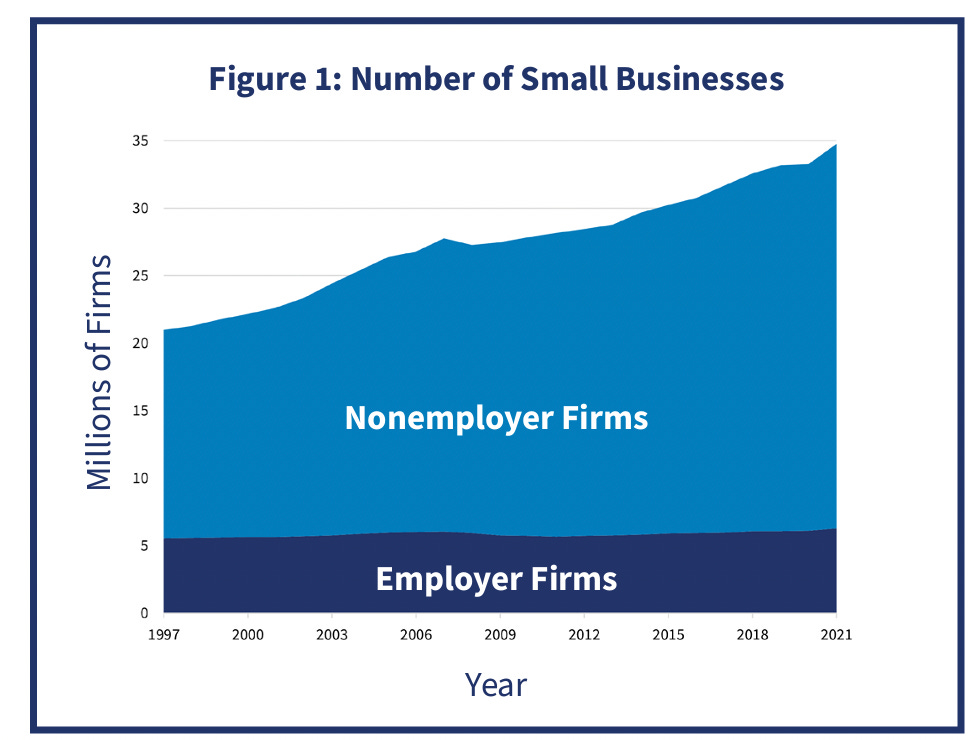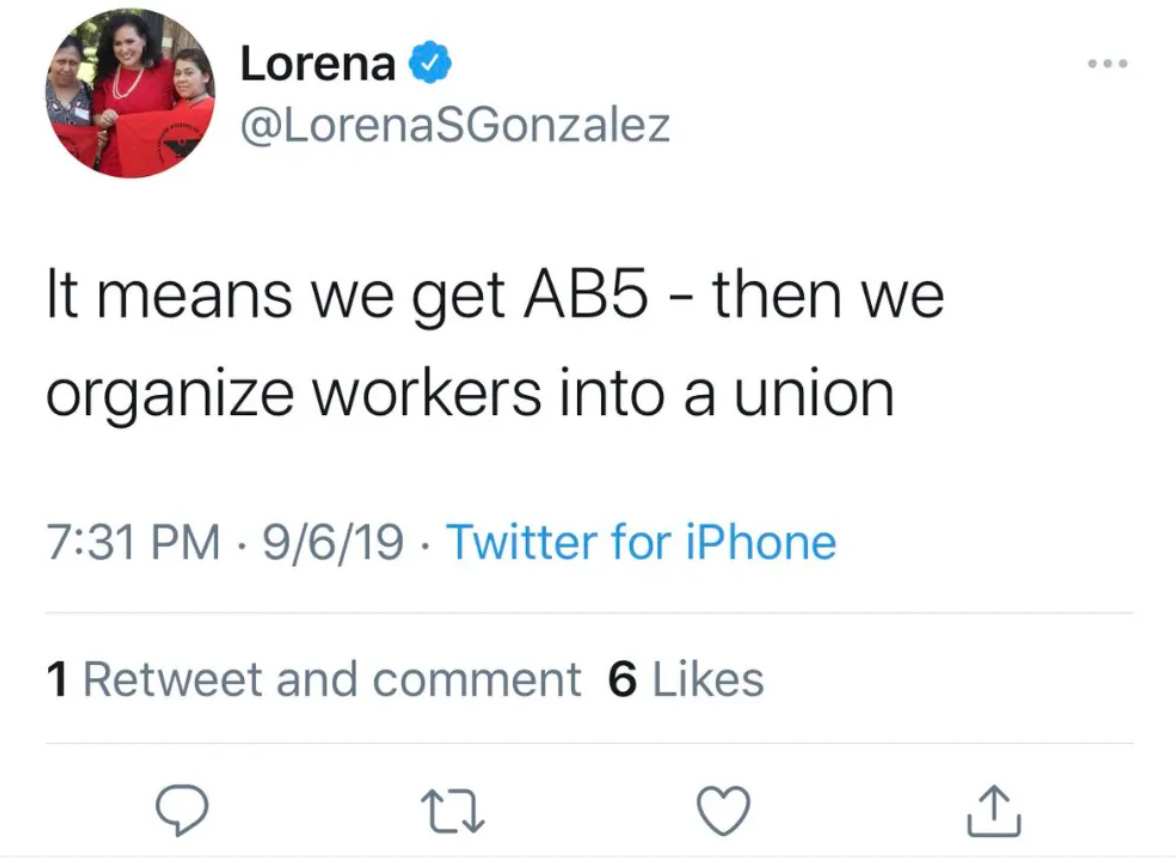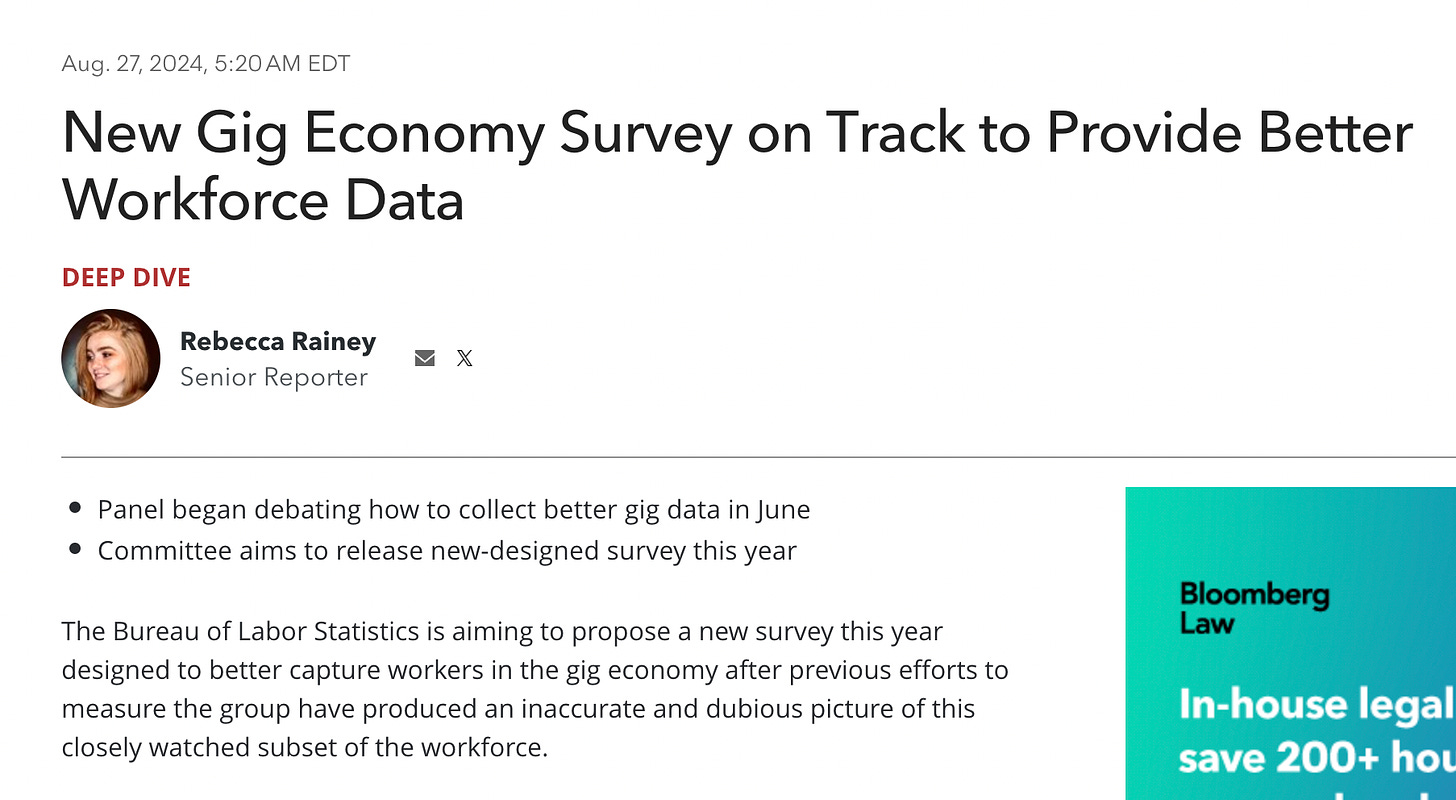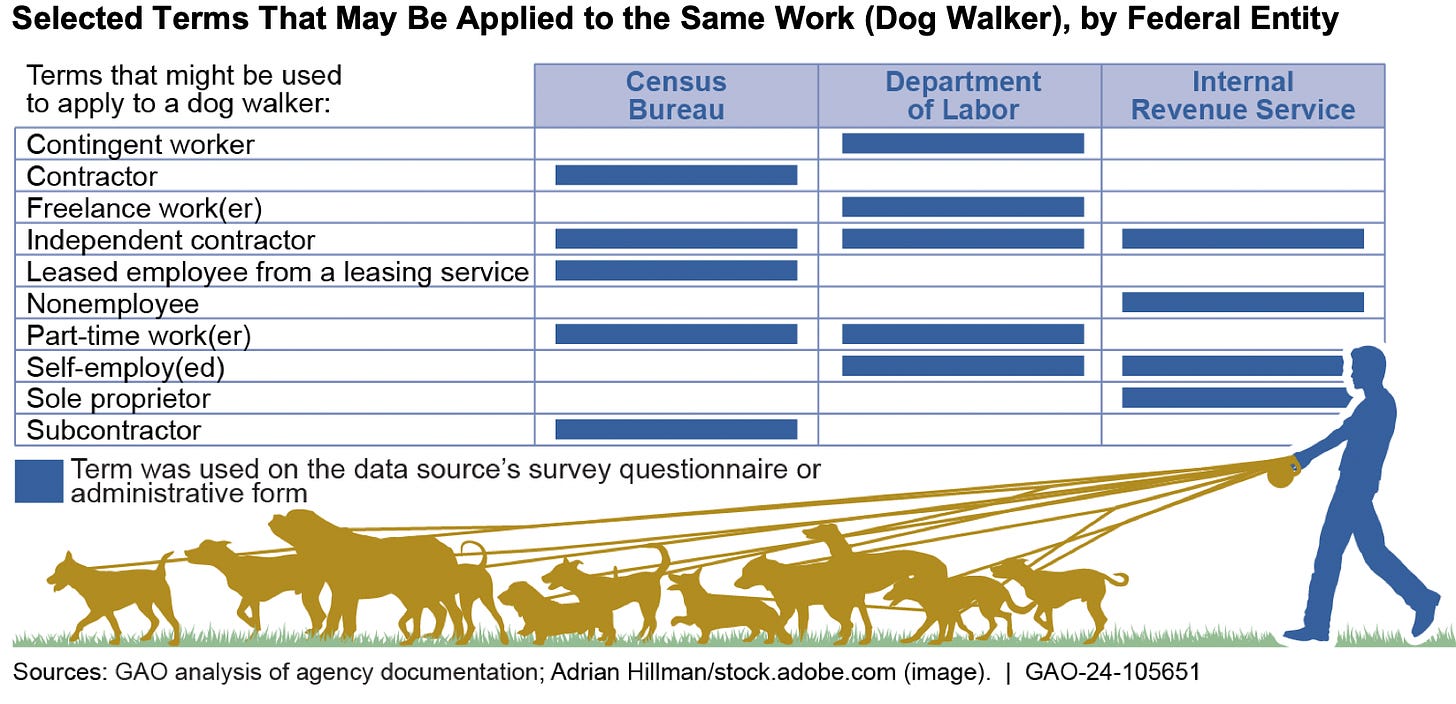Who's Counting?
This government committee intends to "improve" the way independent contractors are counted—in part by writing new definitions of who we are.
Independent contractors like me are understandably leery about government entities that claim they want to redefine us for any purpose whatsoever.
In recent years, many of us who are self-employed have learned again and again—including from state laws like California’s Assembly Bill 5 and federal legislation like the PRO Act—that the freelance-busting brigade’s intent is to redefine our business relationships out of existence, and then push us into unionizable jobs.
This is not paranoia. The freelance busters say so themselves.
Here is Teamster-turned-California-Assemblywoman Lorena Gonzalez, explaining Assembly Bill 5’s intent:
And here is U.S. Rep. Bobby Scott, D-Virginia, saying the same thing about what the federal PRO Act is intended to do if it becomes the law of the land:
Given that the vast majority of independent contractors wish to remain our own bosses—like most Americans, we have no interest in joining a union—those of us who have been fighting to stop the freelance busting keep a close eye on anything that might cause us problems next.
Hence the raised eyebrow upon reading this story, which Bloomberg Law published earlier this week:
The news is that a government Work Arrangements Committee has been formed and is already working on a plan “to improve the measurement of work arrangements, including nonstandard and contract work.”
That includes changing the way the government counts the number of independent contractors nationwide.
Quite a lot of us have said that the government is using outdated independent-contractor data. I’ve said so myself. This new committee was created after the General Accountability Office issued a report stating that government estimates of independent contractors range broadly, from 5% to more than 30% of the total workforce, and that data collection is fragmented across at least seven federal agencies. The bureaucracy has gone so off-kilter that the GAO wrote:
“[M]ultiple terms may be used by one or more agencies to describe a single job—such as a dog walker—depending on specific circumstances.”
The GAO also made a chart to drive home this point:
Hence, the new government committee attempting to clean up the mess the government has made.
What’s going to happen next, according to Bloomberg Law, is that this new committee—likely before the end of the year—will release its results. Its final recommendations are expected by June 2026. At some point, the article states, the proposed changes will be posted in the Federal Register and subject to public comment.
If you’re not familiar with the public-comment process, the government explains it here. Basically, a regulatory agency gives notice that it plans to change something. It then publishes the proposed change (the lingo is NPRM, or “notice of proposed rulemaking”) so the public can comment. After that, the government agency has the power to decide whether to listen to the public a little, or a lot, or not at all.
Independent contractors became intimately familiar with this process when the Biden-Harris administration’s Department of Labor decided to change its independent-contractor rule. A lot of Americans had concerns they sent in writing; the department reported receiving about 55,400 public comments.
Here’s what the bulk of those comments said, in the department’s own words:
Most independent contractors told the government the change was biased against us.
The department then finalized its rule.
After that, a number of independent contractors, including me, became plaintiffs in lawsuits like this one against the government, seeking relief in the courts. As our attorneys explain:
“[T]he DOL’s new rule deliberately prevents workers and businesses from knowing whether anyone is an independent contractor and exposes those who work with freelancers to huge fines and criminal penalties for not knowing.”
That case is still pending.
But the upshot is that once the government starts any given train barrelling down a track toward independent contractors, it can be hard to stop it. Right now, the train is starting down the track in terms of how the government defines us for the purpose of counting us.
According to the charter of this new government committee, it will not “comment on regulation or policies related to the classification of workers for enforcement of labor laws or for tax purposes.”
But obviously, how we are defined and counted—the difference between being measured as small-business owners or gig workers—has the potential to influence all kinds of policies for many years to come.
Committee Members
Yet another thing we’ve learned in recent years is that committees and task forces the government creates to redefine independent contractors don’t typically include many—if any at all—independent contractors.
When a few of us independent contractors traveled to Washington, D.C., last year to testify on behalf of tens of millions of self-employed Americans, federal lawmakers who support freelance busting wouldn’t acknowledge our presence. They refused to ask us a single question or engage with us at all, even as they sat directly across the room from us.
The latest example of people in power trying to minimize the voices of independent contractors is playing out right now in Minnesota. That state has created an Attorney General’s Task Force on Misclassification that is talking about a California-style ABC Test (whose result in California was not more unionizable jobs, but instead fewer independent contractors). Members of the Minnesota task force include one lonely independent contractor, but numerous union representatives.
At the federal level, according to the charter for the new committee that’s working on redefining us to count us all nationwide, here’s how its members were selected:
“The Chief Statistician of the United States invited members of the Interagency Council on Statistical Policy to nominate Federal career staff with appropriate technical expertise to the [Work Arrangements Committee].”
The following agencies elected to nominate one or more members for this new committee:
Bureau of Labor Statistics, Department of Labor (this is the chair of the committee)
Bureau of Economic Analysis, Department of Commerce
Department of Homeland Security
Department of Housing and Urban Development
Economic Research Service, Department of Agriculture
Microeconomics Surveys Unit, Board of Directors of the Federal Reserve System
National Science Foundation
Office of Management and Budget
Small Business Administration
Social Security Administration
Statistics of Income, Internal Revenue Service
U.S. Census Bureau, Department of Commerce
I do not see the term “independent contractor” anywhere on that list. And “federal career staff” is generally the opposite of “self-employed person.”
In addition, according to the American Federation of Government Employees, 25% of overall federal employees are union members, along with 50% of all new federal employees.
So, it seems wise to ask who, exactly, the people are on this government committee to redefine independent contractors and change the way we are counted.
Two days ago, I emailed a request for the names of the committee members, and asked if any committee members are independent contractors.
The government has not replied.
Inclusion Matters
It’s currently unclear whether independent contractors will be given a meaningful voice, or any voice at all, on this committee that’s looking out all across the land at how to redefine us and count us.
If I had a seat on this committee, I’d be asking regulators to consider union-backed research that shows there are real differences between different types of independent contractors. I’d be insisting that regulators understand the devastation they cause when definitions of independent contractors are rewritten in overly restrictive ways.
I’d be suggesting the use of terms like self-employed entrepreneurs.
Or small-business owners.
Or solopreneurs.
Or non-employer firms that comprise more than 80% of all small businesses in America.

I wonder if anybody on the committee is even thinking about these things from the perspective of those of us they intend to count differently.
Or if we are going to be forced to fight yet another attempt to redefine our business relationships right out of existence.










Kim, thanks. What email address did you use for the new committee?